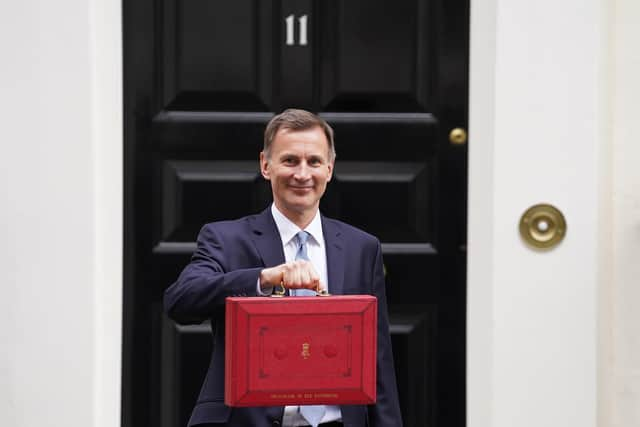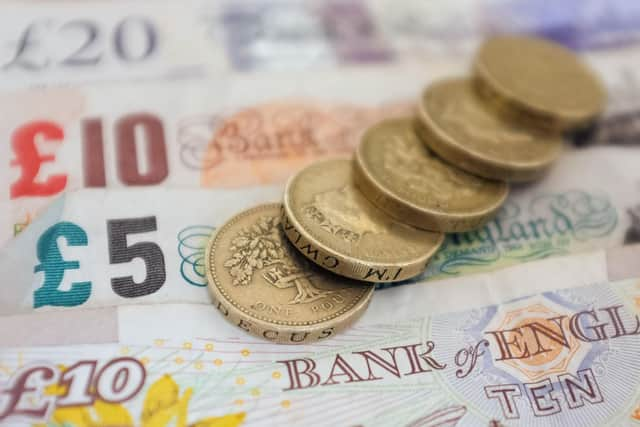Chancellor handed tax-cutting Budget boost as government borrowing eases
Jeremy Hunt has been given a “timely boost” ahead of what is expected to be his final Budget before a general election after the UK government borrowed less money last month than in any December in four years.
Official figures revealed that public sector net borrowing amounted to £7.8 billion during the month. That was £8.4bn less than a year earlier and the lowest in any December since 2019. Economists had expected the figure to top £11.4bn last month. The Office for National Statistics (ONS) said interest that the government paid on loans totalled some £4bn in December, which is £14.1bn less than a year earlier. The reduction was largely because inflation - as measured by the retail prices index - has dropped from its late 2022 peak.
Advertisement
Hide AdAdvertisement
Hide AdTotal net debt was £2.69 trillion at the end of the year, which is around 97.7 per cent of the size of the economy, or gross domestic product (GDP). Despite the fall in net borrowing last month, the debt to GDP ratio was 1.9 percentage points above last December and remains at levels not seen since the early 1960s.


Cara Pacitti, senior economist at the Resolution Foundation, said lower-than-expected inflation towards the end of last year had helped to reduce debt interest costs, and in turn reduce borrowing levels. The latest data leaves borrowing for the year to date £3.7bn lower than the Office for Budget Responsibility’s forecast back in November, and could mean that borrowing is revised down in the updated fiscal outlook published alongside March’s Budget.
Pacitti said: “Lower-than-expected inflation late last year has reduced debt interest costs and given the Chancellor a timely fiscal boost ahead of his Budget [on March 6]. However lower inflation is also likely to mean lower tax receipts. How these factors offset each other will be important in deciding how much fiscal headroom the Chancellor has.”
The ONS said that a year ago changes to student loan repayments came into force and meant that the government thought it would get about £10bn more from people repaying their loans.
Chief Secretary to the Treasury Laura Trott said: “Protecting millions of lives and livelihoods during Putin’s energy shock and a once-in-a-century pandemic has created economic challenges. However, it is right that we pay back these debts so future generations are not left to pick up the tab.


“Because of this government’s decisive action, the economy is now beginning to turn a corner. Inflation has more than halved. Debt is on track to fall as a share of the economy. And we have been able to afford tax cuts for 27 million working people, and an £11bn tax cut to drive business investment.”
With public sector net borrowing for December coming in well below expectations, there is now further headroom for tax cuts in the spring Budget, which is likely to be the final major fiscal event prior to a general election.
Victoria Scholar, head of investment at the Interactive Investor platform, noted: “The reduction in December’s borrowing is a win for the government, providing some fiscal wiggle room to cut taxes in a crucially important year for the Conservatives. The fall in inflation acts as a tailwind to the public purse by reducing the government’s debt interest costs which jumped on the back of rising inflation and interest rates.”
Advertisement
Hide AdAdvertisement
Hide AdHopes for an early cut in interest rates appeared to have been dashed last week following an unexpected uptick in inflation but with the UK economy teetering on the edge of recession the Bank of England may be forced to act sooner rather than later. Inflation has more than halved since peaking at an annual rate of 11.1 per cent in October 2022, following a series of interest rate hikes, but news of an increase to 4 per cent in December, from November’s low of 3.9 per cent, came as a surprise to most economists, who had expected the headline rate of inflation to ease further to 3.8 per cent. While a cut in interest rates is now unlikely in the first quarter of this year, a reduction in the spring is on the cards providing inflation does not spike again.
Danni Hewson, head of financial analysis at investment platform AJ Bell, said the latest health check on public sector finances would be a “cause for celebration” as the Chancellor looks to fund a series of potential tax cuts.
“But the numbers still don’t add up,” she added. “The government’s still spending more than it’s got coming in, but crucially, even though borrowing for the current financial year clocks in at the fourth highest reading on record, it is a whopping £5bn below where the OBR forecast we would be - fertile ground on which Jeremy Hunt can plant nourishing rabbit food with just enough time for the seeds to take root ahead of the first of his anticipated fiscal set pieces in March.
“Whatever he is able to reap in a couple of months’ time will deplete the Treasury’s ability to spend the next time the country has to weather an economic storm. Relieving some of the tax burden that has weighed on our personal finances might be a vote winner, but without an economy firing on all cylinders there will be big questions about what’s left in the tank. Debt to GDP is almost 2 per cent higher than it was a year ago and the path back from that brink looks hard going.”
Comments
Want to join the conversation? Please or to comment on this article.